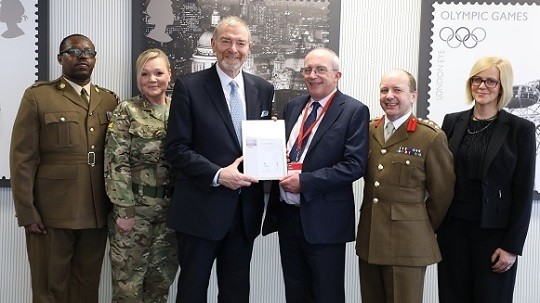Royal Mail actively supports employees who are reservists for the UK Armed Forces.
We have around 200 military reservists – one of the largest groups in the country – who combine working for us with protecting their country at home and overseas.
The Royal Mail Group Armed Forces network supports reservists, ex-regulars and their spouses, recognising those who have served, continue to serve, and are part of the Forces community.

We are proud to be an armed forces-friendly company. Many current Royal Mail employees are ex-servicemen and women or reservists and have played – and continue to play – a key role in keeping the UK safe. They also play a fundamental part in delivering Royal Mail’s high-quality service to homes and businesses across the country. We believe it is important that Royal Mail continues to support them both within and outside the business.
Our service history
Our association with reservists stretches back into our 500-year history. We can trace this back to 1816 when General Post Office (GPO) volunteers went to Paris to assist British Forces with their communications following the defeat of Napoleon, and then went on to serve in the Crimean War.
The next significant milestone was the support provided during the Fenian bombing campaign of 1867, which resulted in a 1,000-strong regiment being formed – the 49th Middlesex Rifle Volunteers, who saw action in Egypt, the Sudan, Khartoum and the Boer War.
The 49th became the Army Post Office Corps, and by the time of the First World War, were badged as the Post Office Rifles.
During the First World War the GPO released more than 75,000 employees to fight, of whom 12,000 served in the Post Office Rifles.
Since the disbanding of the Post Office Rifles, Royal Mail employees have subsequently served in 89 Postal and Courier Regiment. We now retain strong links with 162 Movement and Postal & Courier Regiment along with employees who serve across the tri-services.
We continue to do as much as we can to uphold this proud tradition of supporting Armed Forces personnel and their families, as well as those who have left the services.
Armed Forces Covenant
In 2015, Royal Mail signed the Armed Forces Covenant to support the armed forces community in the UK.
This marks our recognition of the value that serving regular and reservist personnel, veterans and military families contribute to the business and to the UK. As part of the covenant, we will promote the fact that Royal Mail is an armed forces-friendly organisation actively championing our reservists and their activities.
We will also:
- Encourage partner organisations and suppliers to join the corporate covenant scheme
- Promote the fact that we are an armed forces-friendly organisation by publishing our covenant in our depots, branches and offices
- Continue to honour our armed forces through the issue of Special Stamps and postmarks
- Aim to actively participate in Armed Forces Day and Reserves Day
- Work with the Career Transition Partnership to look for opportunities of employment for veterans and service leavers within Royal Mail
- Engage with the Recovery Career Services to support, as far as is practicable, employment opportunities for wounded, injured or sick veterans
- Take into account the military commitments of a spouse of a member of the armed forces when reviewing requests for leave
- Continue to support employees who choose to be members of the Reserve forces, including by accommodating their training and mobilisation
- Continue to work with the Ministry of Defence to make it easier for companies to get effective BFPO virtual postcode data to enable the armed forces community to access goods and services online while overseas.
Military leave entitlement (including Territorial Army)
- Employees are usually provided with two weeks’ paid time off for their Annual Active Service Commitment
- Additionally, a maximum of nine days per year unpaid time off may also be granted to cover travel to six mandatory weekend training camps
- Any additional time must be taken from the employee’s annual holiday entitlement.
To qualify for military leave, employees must provide evidence to their manager on each occasion that time off is required. This can usually be done by showing your ‘call-out notice’. Individuals normally receive six months’ notice of their call up and should advise their manager as soon as possible.
Information on the rights and responsibilities for employers and reservists can be obtained here.
